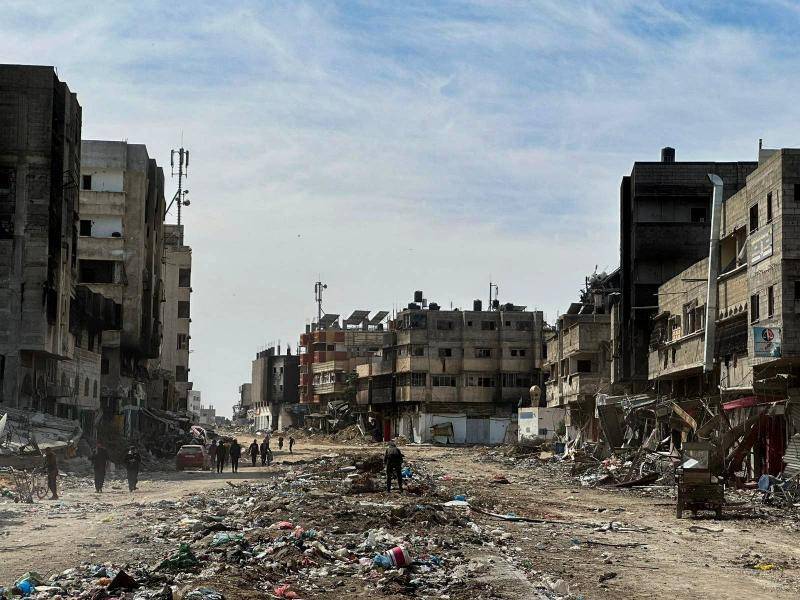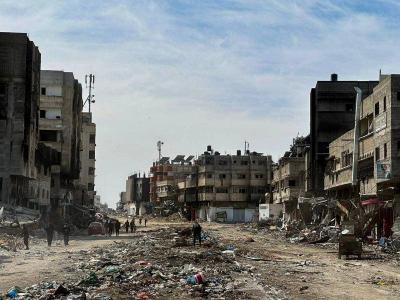The Israeli attack on the Gaza Strip has led to the displacement of most of the 2.3 million residents of the area, resulting in a severe humanitarian crisis characterized by acute shortages of food, water, and medicine. Here are some important facts about the situation in Gaza:
**Displacement**
The UN Relief and Works Agency for Palestine Refugees (UNRWA) reports that about 1.7 million people, over 75% of the population, have been displaced within Gaza, with many being forced to flee multiple times. Last month, Israel intensified its bombardment of the city of Rafah in southern Gaza near the Egyptian border, where about 1.5 million people are crowded. Most of the residents currently in Rafah have fled from their homes in the northern Gaza Strip to escape the Israeli military campaign that began following the attack by militants from the Islamic Resistance Movement (Hamas) on southern Israel on October 7.
**Health and Hospitals**
The World Health Organization indicates that most of the 36 hospitals in the Gaza Strip have ceased operations. Of these hospitals, only 12 are partially operational—six in the north and six in the south—while the Al-Amal hospital in Khan Younis is functioning at minimal capacity. Richard Piekloorn, WHO representative in Gaza and the West Bank, stated that over eight thousand people require transfer out of Gaza for medical treatment. He added that approximately six thousand people need to leave the territory due to war-related injuries and illnesses, while two thousand suffer from cancer and other serious chronic diseases. A WHO team visited the Kamal Adwan and Al-Awda hospitals in northern Gaza last Sunday to deliver supplies for the first time since fighting began. Piekloorn described the situation at Al-Awda hospital as "particularly horrific" due to the destruction of one of its buildings. Ahmad Zaher, head of WHO's sub-office in Gaza, stated, “The two hospitals we visited represent the health system as a whole in Gaza, as they struggle to continue functioning with minimal aid, making it barely able to serve those in need.” He added, "Both hospitals faced shortages of fuel, power, and specialized staff. The majority of those admitted to the hospitals were suffering from trauma." The Gaza Ministry of Health announced on Sunday that at least 15 children had died in recent days due to malnutrition and dehydration at the Kamal Adwan hospital in northern Gaza. Most requests from WHO to visit northern Gaza were denied, with only three out of sixteen requests being facilitated. The organization noted that no requests for self-led missions in northern Gaza were allowed last month.
**Humanitarian Aid and Hunger**
Israel halted all imports of food, medicine, energy, and fuel to Gaza with the onset of war. It later allowed shipments of aid to enter. However, relief organizations say that security inspections and movement difficulties in a war zone severely hinder their operations. UN agencies report that malnutrition rates among children in northern Gaza are "extremely high," approximately three times higher than those in the southern part of the Palestinian territory, where more aid is available. Jens Laerke, spokesperson for the UN Office for the Coordination of Humanitarian Affairs, remarked, "When children begin to starve to death, it should serve as an unparalleled warning." He added, "If not now, when is the right time for us to exert our utmost efforts, declare a state of emergency, and flood Gaza with the aid it needs?" Piekloorn from WHO stated that one in six children under the age of two in northern Gaza suffers from acute malnutrition. Calls for Israel to take more actions to address the humanitarian crisis have increased since Palestinians gathering for aid in Gaza were killed last month. Gaza health authorities reported that 118 people were killed by Israeli fire in what they described as a massacre. Israel claims that many of these individuals were run over and has pledged to conduct an investigation. The U.S. military executed its first airdrop of food aid to Gaza's residents on Saturday and intends to conduct more. The airdrop is viewed as the latest indication that Washington is beginning to move beyond diplomatic channels with Israel, which has been accused by the UN and other relief agencies of blocking or restricting access to aid. Israel denies impeding humanitarian assistance.




